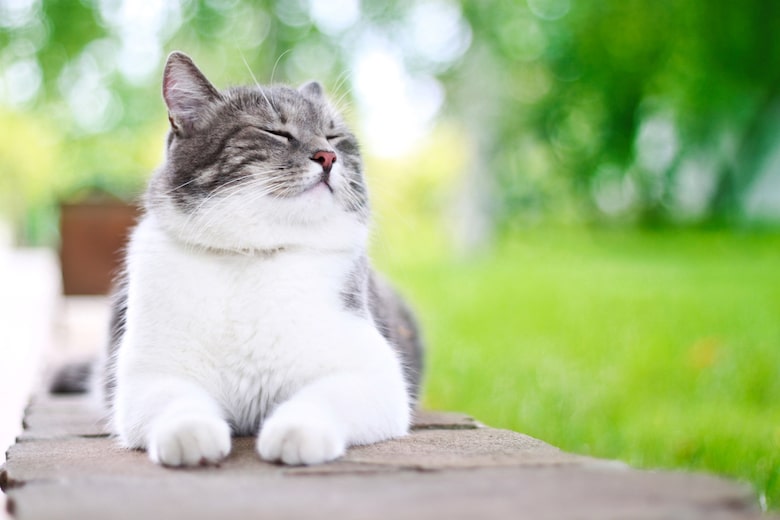Throughout the long and hard winter, summer is the one thing on our minds. I can’t wait to feel the sun on my skin — albeit cloaked in sunscreen — and feel the blood coming back to my extremities. Chances are your cat might be excited about summer, too.
While outdoor threats to cats are year-round, cats have more dangerous exposure in the beautiful weather of summer, when owners can be tempted to let cats wander outside. (Catster recommends installing a catio instead.) With summer comes danger lurking around every corner, from UV rays to heatstroke and reptiles and insects that bite and sting, along with other animals
carrying parasites. Let’s look at some of the biggest concerns.
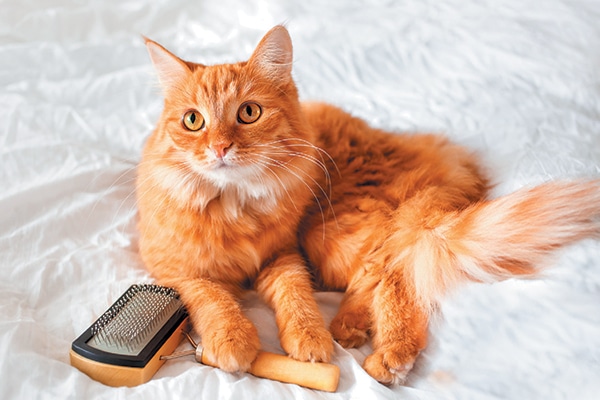
Do Cats Shed More In Summer?
With warmer weather, your cat can start to shed a fluffy winter coat to a more manageable, lighter summer coat. This shedding might lead to hairballs or more dire concerns. Lynn Paolillo, certified feline master groomer and certified feline creative groomer of the National Cat Groomers Institute shares that cats can ingest upward of a third of the amount of hair they shed. This can lead to hairballs or vomiting, and even some dangerous blockages that require veterinary care. However, she adds that “regular combing, bathing and grooming removes the hair before it can be ingested, preventing hairballs or more severe issues.”
While this can make you think about shaving your cat or giving him a buzz cut, cats that live indoors with temperature-controlled rooms don’t need haircuts, as long as their excess coat or tangles are regularly removed with brushing. This regular bathing and brushing prevents matting that could lead to overheating. If a cat is already matted or is more prone to matting and does well with haircuts, then a trim done by a professional cat groomer can help with preventive maintenance, according to Lynn. Even for indoor cats, regular brushing, regardless of fur length or type, should be a high priority during these season changes.
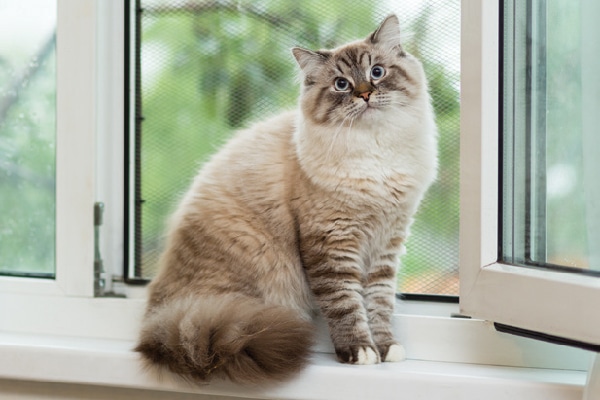
Summer Safety Tips for Your Cat
Sunscreen
While you should use sunscreen for pets, it’s a little more complicated than buying regular sunscreen off of a store shelf. Human sunscreens may contain ingredients harmful to cats. Lynn says that since cats are fastidious lickers, products that are left on the skin should be avoided. While there are sunscreens made specifically for dogs, there isn’t one on the market made just for cats — yet. Check with your feline veterinarian before using any sunscreen on your cat just to make sure that your brand of choice is safe.
Thankfully, the average indoor cat is not at risk for skin damage due to the sun, and sunscreen isn’t a summer necessity for your feline friends (unless he just can’t stay away from that spot in front of the window no matter how hot he gets). If you are concerned about feline solar dermatitis, limit your cat’s peak sun exposure through any windows or doors where light shines in. Are there any specialty concerns for hairless cats? Lynn adds, “Hairless cats can have more sensitive skin. Being outdoors is not recommended for hairless cats since they lack protection from sharp branches, sticks, burrs, other critters, etc.” Talk to your veterinarian about cat-friendly non-toxic sunscreen options, or a cover-up for hairless cats during summer.
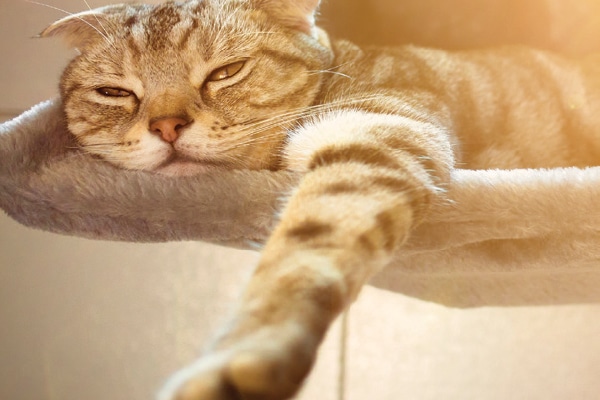
Heatstroke
Scorching temperatures aren’t just uncomfortable for us, also think of your cat’s exposure to heat, too. Heatstroke is a scary thing and can look a little different in cats than you might expect. Cats aren’t typically open-mouth breathers, so any panting, similar to that of a dog, is an immediate concern. Also, any lethargy or difficulty walking requires fast-acting vet care.
Dr. Heather Loenser of the American Animal Hospital Association adds, “You can use warm water (not cold) on a cat’s abdomen, ears and paws and then turn a fan on them to mimic sweat. Cats, like dogs, don’t sweat to cool down, so this method of cooling by a veterinary team or pet owner will be appreciated by the cat. No matter what, go to your vet for further care, even if your cat seems to be acting normally after being overheated.”
Who’s at risk for heatstroke? Older cats and young kittens because they aren’t as good at regulating their body temperature, plus cats with conditions like asthma and kidney disease. Heatstroke signs include body temperature of above 104 degrees Fahrenheit, rapid pulse, rapid breathing, stumbling, lethargy, vomiting and sweaty feet.
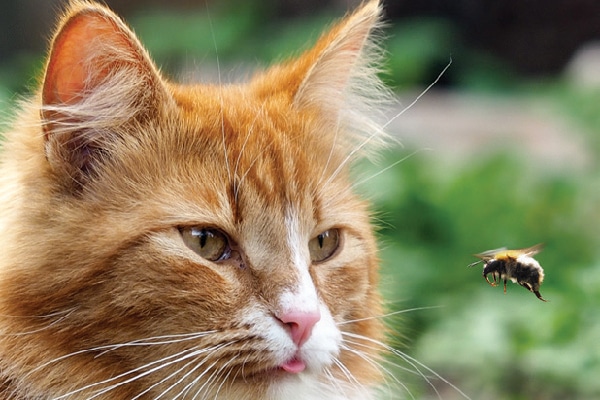
Bites & Stings
What about parasites, bugs, reptiles and other things that bite and sting? Pet introduction to the outdoors also introduces your cat to parasites, viruses and bacteria. Note any changes in behavior to your veterinarian, along with any details about accidental outdoor exposure your cat may have, like access to new plants, neighborhood animals, strays, wildlife, etc.
As far as fleas, consult with your veterinarian on a good flea control program. Rick Marrinson, DVM, warns that simply purchasing a flea control product off the store shelves may be ineffective or even harmful — as some may be toxic to cats. Regularly change the cat’s bedding and vacuum frequently to help control fleas, along with veterinary visits and the use of any preventive products. Dr. Loenser adds, “Seek veterinary care if you think your cat has been bitten by anything with teeth,” including snakes, wildlife, or even other cats or dogs. A vet visit can help stop pain and infection from an unknown bite. She says not to treat wounds with topical antibiotics or ointments, as some cats can have allergic reactions to some of the ingredients. Also, they can easily lick off the ointment, making it ineffective and further irritating a wound.
Worried about a bite or sting? Although rare, Dr. Marrinson notes that cats can have anaphylactic reactions to insect stings. If your cat has swelling of her face, paws or legs, take her to the vet immediately.
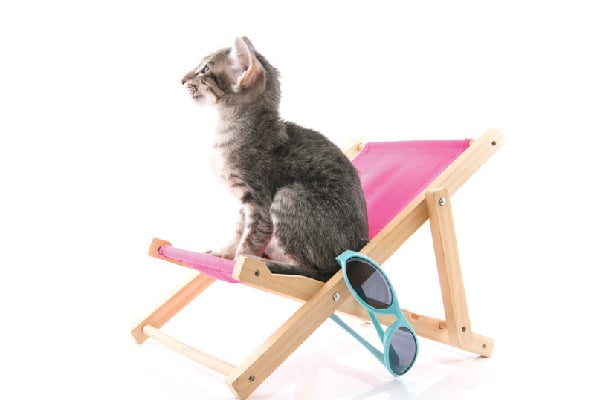
The bottom line on summer safety for cats
While it might be a beautiful day, it’s easier and safer for cats to stay indoors and watch the season from the safety of your home. Even for indoor cats, always offer shade and plenty of easily accessible water during hot summer months. If you’re heading out this summer without your fur friend, keep a list of numbers for emergency veterinarians in your area for your fur-sitter, and keep the air conditioning on. With the right precautions and preventive measures, summer can be a safe and enjoyable season with your feline.
Read Next: 10 Tips for Traveling with Cats on a Road Trip This Summer

